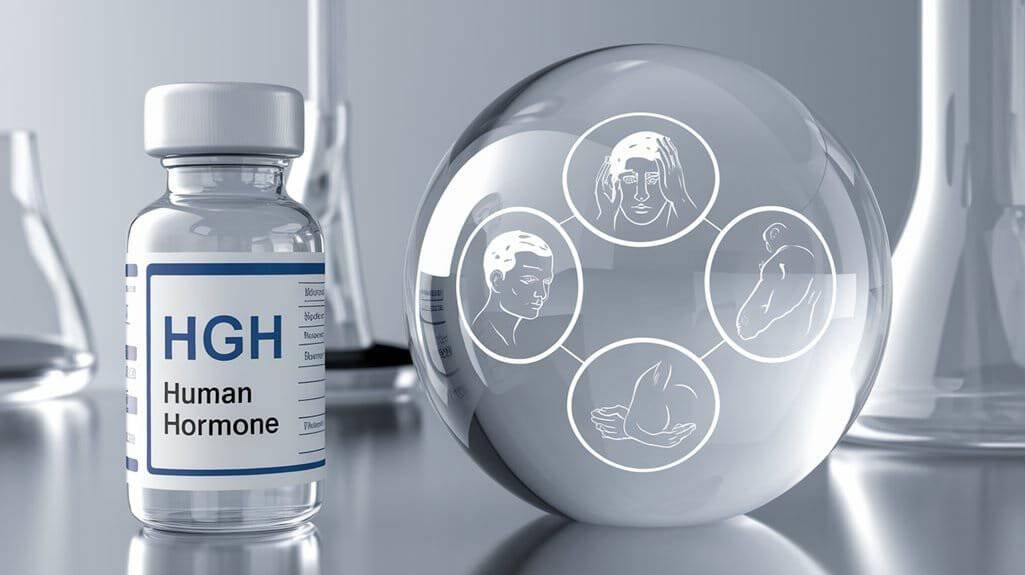Considering the side effects of HGH therapy is essential for your health. Short-term effects, like injection site pain and appetite fluctuations, can impact your comfort. Long-term risks, such as increased cancer risk and cardiovascular complications, must be weighed carefully. Eligibility factors and the potential for misuse also play significant roles. Understanding these aspects guarantees you make informed decisions about your treatment. Exploring further can help you uncover important details about managing therapy safely.
Key Takeaways
- Understanding side effects helps patients make informed decisions about initiating HGH therapy and its potential impact on their health.
- Knowledge of common short-term side effects allows for better preparation and management of initial discomfort and symptoms.
- Awareness of long-term health risks emphasizes the need for thorough evaluation and consideration of personal health history before starting treatment.
- Recognizing the risks of misuse and abuse can prevent serious health complications and promote responsible use under medical supervision.
- Educating patients about side effects fosters better communication with healthcare providers, enhancing overall treatment success and safety.
Common Short-Term Side Effects

When you undergo HGH therapy, you may experience several common short-term side effects that can vary in intensity. One of the most prevalent issues is injection pain, which can manifest as localized swelling and redness at the injection site. Additionally, fluid retention frequently occurs, leading to noticeable swelling in various body parts. This can be accompanied by joint and muscle pain, causing discomfort during movement. You might also notice fluctuations in appetite, as gastrointestinal disturbances are common among users. In some cases, high blood sugar levels can temporarily rise, necessitating monitoring. Growth hormone is known to potentially cause serious side effects in individuals who are not growth hormone deficient. As GH levels typically decline from childhood to middle age, these side effects typically resolve with time; however, Sermorelin offers a more natural solution that may help mitigate these risks. Their occurrence can impact your daily activities and overall experience with HGH therapy.
Long-Term Health Risks
Long-term HGH therapy can pose significant health risks that warrant careful consideration. Here are key concerns to keep in mind:
- Increased cancer association: Studies suggest a potential link between HGH therapy and certain cancers, particularly colon cancer and Hodgkin's disease.
- Cardiovascular complications: HGH therapy may induce hypertension and escalate the risk of serious cardiovascular events, including heart disease and stroke.
- Mitogenic effects: HGH's capacity to promote cell growth raises worries about malignancies.
- Unforeseen consequences: Long-term hormonal imbalances induced by HGH can lead to unpredictable adverse effects on overall health.
These risks underscore the necessity for thorough evaluation before commencing HGH therapy, especially concerning cancer and cardiovascular health.
Patient Eligibility and Safety Considerations

Determining patient eligibility and safety for HGH therapy requires meticulous assessment of several criteria. Proper patient evaluation guarantees that specific eligibility criteria are met, minimizing risks involved with the therapy.
| Criteria | Details | Safety Measures |
|---|---|---|
| Age and Medical Condition | Must be one year or older; specific disorders | Confirm diagnosis before treatment |
| BMI Requirements | Adults typically need a BMI below 40 kg/m² | Assess BMI prior to therapy |
| IGF-1 Levels | Should be within normal ranges for age/gender | Regular monitoring during therapy |
| Endocrinologist Evaluation | Required for establishing need | Continuous follow-up with specialists |
Regular check-ups, monitoring of blood sugar, and assessment of pituitary function are critical to maintain safety and address potential complications effectively.
Risks of Misuse and Abuse
Despite the important safety considerations and eligibility criteria for HGH therapy, the misuse and abuse of human growth hormone present significant risks that warrant attention.
Athletes often face immense pressures and may fall victim to HGH misconceptions, believing it'll enhance performance.
The consequences of misuse include:
- Increased heart disease and metabolic disorders
- Joint pain and fluid retention from excessive doses
- Co-abuse with anabolic steroids, amplifying health risks
- Difficulty in detection, complicating treatment efforts
Given these threats, it's vital to navigate the complexities of HGH use responsibly.
Without medical supervision, the allure of HGH for performance or anti-aging can lead to devastating health consequences.
Understanding these risks helps inform better decisions regarding HGH therapy.
Importance of Patient Education and Awareness

Patient education and awareness are critical components of successful HGH therapy, ensuring individuals grasp its complexities and implications.
Informed consent plays a pivotal role, as you'll need a thorough understanding of both the benefits and limitations of the therapy.
Managing treatment expectations is essential; realistic goals can mitigate disappointment and enhance compliance.
Effective communication fosters trust and encourages patient involvement, creating an environment conducive to open discussions about potential side effects.
Involving family members can further support your journey, helping to optimize health outcomes.
Adequate nutritional guidance, regular physical activity, and emotional wellness are foundational elements that enhance the therapy's effectiveness, making continuous education an important aspect of your HGH treatment protocol.
Frequently Asked Questions
How Is HGH Administered in Therapy?
HGH therapy utilizes various injection techniques, primarily subcutaneous injections, aligning with dosage guidelines. You can use injector devices, such as pens or auto-injectors, for improved administration, promoting compliance and ensuring accurate hormone delivery.
What Is the Typical Duration of HGH Therapy?
On average, HGH therapy duration typically spans several years, with treatment timelines differing by diagnosis. For example, idiopathic GHD usually requires years of therapy until growth plates close, highlighting the need for individualized approaches.
Are There Age Restrictions for HGH Therapy?
Yes, there are age differences in HGH therapy eligibility criteria. Children typically start between 3.1 to 15.7 years, while adults may initiate treatment based on specific conditions, emphasizing the need for age-appropriate assessments before therapy.
Can HGH Therapy Interact With Other Medications?
Yes, HGH therapy can interact with other medications, impacting safety and efficacy. Monitoring for HGH interactions is vital to guarantee medication safety, as many drugs may contribute to complications and require careful management throughout the treatment process.
What Should I Do if I Experience Severe Side Effects?
If you experience severe reactions, don't panic—your health's at stake! Prioritize side effects management by seeking immediate medical advice, documenting symptoms, adjusting dosages with your doctor, and exploring alternative treatments to safeguard your wellbeing.
Conclusion
In considering HGH therapy, you're venturing into a landscape marked by potential benefits and pitfalls, much like Icarus soaring too close to the sun. You must weigh the common side effects and long-term health risks against the allure of enhanced performance. Stay informed about your eligibility and the dangers of misuse. Prioritizing education and awareness empowers you to navigate this complex terrain safely, ensuring that your pursuit of health doesn't lead to unintended consequences.
References
- https://medlineplus.gov/druginfo/meds/a622022.html
- https://pmc.ncbi.nlm.nih.gov/articles/PMC3678547/
- https://www.healthline.com/health/hgh-side-effects
- https://www.medicalnewstoday.com/articles/312905
- https://www.health.harvard.edu/diseases-and-conditions/growth-hormone-athletic-performance-and-aging
- https://www.mayoclinic.org/drugs-supplements/growth-hormone-parenteral-route/description/drg-20069416
- https://www.chp.edu/our-services/endocrinology/resources/endocrinology-patient-procedures/growth-hormone-treatment
- https://scholarworks.bwise.kr/cau/bitstream/2019.sw.cau/53807/1/Protect Your Sky A Survey of Counter Unmanned Aerial Vehicle Systems.pdf
- https://healthon.com/blogs/journal/the-role-of-hgh-in-anti-aging-benefits-and-risks-explained
- https://erc.bioscientifica.com/view/journals/erc/30/7/ERC-23-0026.xml






